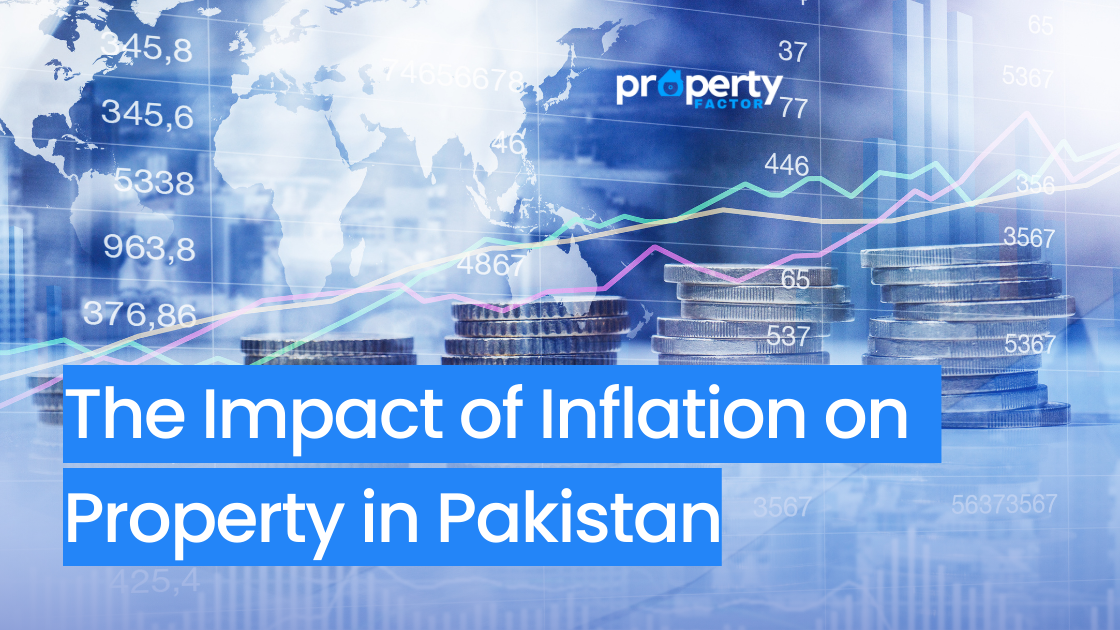Table of Contents
ToggleIntroduction
At Property Factor, we recognize the importance of staying informed about the latest trends and factors that influence the real estate market in Pakistan. In this article, we will explore the impact of inflation on property prices in the country. By analyzing historical data and examining market dynamics, our aim is to provide valuable insights that will assist you in navigating the ever-changing landscape of real estate investments in Pakistan.
The Underdeveloped and Undercapitalized Housing Industry in Pakistan
In recent years, the housing industry in Pakistan has remained underdeveloped and undercapitalized. While incentives have been directed towards the lower middle class to encourage home purchases, this has led to a rise in mortgage loans among upper-middle-class families. However, the increase in home prices has made it challenging for the lower and middle classes to enter the market. Unfortunately, mortgage loans in Pakistan are often limited to high earners, neglecting those who are in greater need of housing financing.
Government Initiatives and Housing Finance
To address the issue of affordable housing, the Pakistani government established the Exim Bank of Pakistan (EBP) and the Pakistan Mortgage Refinancing Corporation (PMRC) in 2015. Both institutions were created to enhance housing finance and improve public access to affordable housing. These programs encompass both conventional and Islamic financial models, aiming to cater to a diverse range of potential homebuyers.
Construction Industry’s Contribution to the Economy
According to the Pakistan Economic Survey for FY22, the construction industry accounted for 3.2% of the country’s GDP. Additionally, approximately 9.57% of Pakistan’s labor market is employed in this industry. While banks and lending organizations receive numerous requests for house loans each year, a significant percentage of these loans end up in default.

Challenges in Home Financing
Banks in Pakistan typically grant loans ranging from 2 million to 8 million rupees, which is often insufficient to cover the cost of homes in major urban areas as a result of the rising inflation. Consequently, most banks and lenders require borrowers to make substantial down payments. The State Bank of Pakistan (SBP) estimates that the ratio of affordable home prices to household income in Pakistan is 22:1, much higher than the global average of 5:1. As a result, more than half of the urban population resides in slums and shanty communities.
Real Estate Market and Informal Economy
Pakistan has experienced significant changes in house prices compared to other Asian countries. The informal economy, accounting for a substantial portion of the country’s GDP (between 70% and 91%), plays a role in these fluctuations. The real estate market, in particular, has become a hub for concealing wealth, evading taxes, and engaging in money laundering due to regulatory oversights and low official property valuations.
Government Measures and Their Impact
In recent years, the Pakistani government has taken measures to regulate the real estate market and address tax evasion and money laundering issues. Amendments to the Finance Bill in 2016 and the Finance Act in 2018 aimed to control the market and prevent unregistered and undocumented investments. However, these measures hindered the market’s growth and contributed to the formation of a real estate bubble.
Importance of Housing Finance
Despite the rising home prices, housing finance remains underdeveloped and undervalued in Pakistan. Development economists emphasize the significance of housing finance in promoting economic and social progress. To encourage financing for housing and development, the SBP has urged banks to allocate 5% of their private sector advances for this purpose.
Obstacles to Affordable Housing
Pakistan faces several challenges in addressing its housing crisis, including the absence of a comprehensive land record system, stringent site development regulations, limited financing options for lower-to-middle-income groups, and banks’ reluctance to increase mortgage volumes due to legal uncertainties and unclear title deeds.
The Naya Pakistan Housing Plan
In response to the housing issue, the ambitious Naya Pakistan Housing Plan (NPHP) was introduced in 2018. This program aims to develop at least five million affordable homes nationwide, providing a solution for low-income households.
Understanding Inflation and Its Influence on Property Prices
Inflation refers to the consistent increase in the general price level of goods and services over time. Like any economic phenomenon, inflation can significantly affect the real estate sector, shaping property prices and investment opportunities. Let’s delve into the relationship between inflation and property prices in Pakistan in detail.
Historical Analysis of House Prices and Inflation
To grasp the effect of inflation on property prices, it is essential to study historical data and observe the patterns that have emerged. According to the latest trends, house prices in Pakistan have experienced fluctuations due to inflation.
Rising Property Prices: A Consequence of Inflation
Over the past decade, Pakistan has witnessed a gradual increase in house prices, primarily driven by inflationary pressures. Inflation erodes the purchasing power of the local currency, leading to higher construction costs, raw material prices, and labor expenses. These factors ultimately contribute to the rise in property prices.
Regional Disparities in Property Price Growth
It is crucial to note that the impact of inflation on property prices can vary across different regions in Pakistan. Metropolitan areas and major cities often experience more significant price fluctuations due to higher demand and increased urbanization. On the other hand, rural areas may exhibit relatively lower levels of property price growth.
Factors Amplifying the Impact of Inflation on Property Prices
Several factors amplify the influence of inflation on property prices in Pakistan. Understanding these factors can provide you with a comprehensive view of the real estate market and enable you to make informed investment decisions.
1. Demand and Supply Dynamics
The interplay between demand and supply plays a crucial role in shaping property prices in the face of inflation. If the demand for housing exceeds supply, prices are likely to rise. Factors such as population growth, urban migration, and changing demographics contribute to shifts in demand, which can further exacerbate the impact of inflation.
2. Monetary Policy and Interest Rates
Monetary policy decisions made by the State Bank of Pakistan, including changes in interest rates, can have a significant impact on the real estate market. When inflation rises, central banks may implement measures to control it, such as increasing interest rates. Higher interest rates can reduce affordability and curb demand, consequently affecting property prices.
3. Government Policies and Regulations
Government policies and regulations can also shape the real estate market in the face of inflation. Initiatives promoting affordable housing, tax incentives for investors, and infrastructure development projects can influence property prices. Conversely, regulatory changes or economic instability may introduce uncertainties and impact market sentiment.
Strategies for Navigating the Impact of Inflation on Property Investments
As an investor, it is crucial to adopt strategies that mitigate the impact of inflation on your property investments. Here are some effective approaches to consider:
1. Diversification and Risk Management
Diversifying your investment portfolio across different asset classes, such as stocks, bonds, and real estate, can help mitigate the risks associated with inflation. Allocating a portion of your investment capital to real estate can provide a hedge against inflation, as property values tend to appreciate over the long term.
2. Focus on Emerging Areas and Development Projects
Identifying emerging areas and development projects can present lucrative investment opportunities. Such regions often offer relatively lower property prices compared to established urban centers. As these areas undergo infrastructural development and experience growth
, property values can rise significantly, providing favorable returns on investment.
3. Long-Term Investment Horizon
Real estate investments should generally be approached with a long-term perspective. While short-term fluctuations due to inflation are inevitable, the real estate market tends to stabilize and appreciate over extended periods. Holding onto properties for the long term allows you to benefit from capital appreciation and rental income, thus offsetting the impact of inflation.
Conclusion
In conclusion, understanding the effect of inflation on property prices is crucial for making informed investment decisions in Pakistan’s real estate market. By analyzing historical data, recognizing regional disparities, and considering various factors that amplify the impact of inflation, you can effectively navigate the market. Diversification, focusing on emerging areas, and adopting a long-term investment approach are key strategies to counter the effects of inflation on property investments. Stay informed, evaluate market dynamics, and consult with experienced professionals to maximize your real estate investment potential in Pakistan.
While Pakistan’s property market is experiencing a slowdown from its unsustainable peak, it has not yet crashed. Rising inflation and concerns about an impending recession have led potential buyers to become more cautious. However, the dream of owning an affordable home remains distant for Pakistan’s lower and middle classes. The lack of foreclosure rules and limited access to housing financing pose significant obstacles. Urgent initiatives are needed to improve housing financing and ensure public access to affordable housing in Pakistan.



